______________________________________________________________________________
9h45 Allocution d’ouverture / Opening Speech
Professeur Nicolas Clinchamps, Directeur de l’IDPS (Institut de Droit public, Sciences politiques et sociales), Université Sorbonne Paris Nord
|
10h Panel 1:
Environment and Social Justice on Screen |
Poonam
Arora
Title:
Representation of the Cooperative Movement as an Expression of Social Justice
in Mantham (Shyam
Benegal, India, 1976)
My paper will address the textual representation of the agrarian cooperative movement in the film Manthan/The Churning (Shyam Benegal, India, 1976); the conditions under which the film was produced; and the cathexis it affected between initiatives of social justice, political reform, and the progressive function of art in this context. Manthan was recently remastered and re-released at the 2024 Cannes Film Festival where it received a very favourable reception as a modern classic of world cinema.
I pose the following question in this presentation: What narrative strategies, advertising campaigns, and representations of social justice activism cohere in the film text such that the ostensibly failed efforts of a nascent cooperative movement among the milk-producers of Gujarat in the early 1970s (as shown in the film) turn into one of the most positive social justice and collective art production initiatives in India, in the half century since.
India is today not only the largest
producer of milk in the world, but the cooperative known as AMUL—Anand Milk
Union Limited--has been emulated by other under- developed economies of the
world, and held up as a model by the United Nations Development Fund. The film was financed by each member of the
Amul cooperative contributing Rs. 2 each (roughly the equivalent of the price
of one litre of milk)—amodel for crowd funding we are so familiar with today.
________________________________________________________________________
Bio:
Poonam Arora holds a Ph.D. in Film Studies from the State University of New
York, Binghamton, 1991. She began teaching Film at the University of Michigan,
Dearbornin 1989. Subsequently, she shifted her focus to deploying film texts in
teaching Humanities courses more broadly, including a course—American Cinema,
American Industry--to union members of the United Auto Workers—UAW. A senior
administrator for diversity, equity and inclusion, she retired in 2019 as the
Associate Dean of the College, Grinnell College, a premiere liberal arts
college in Iowa, USA. She now runs a you tube channel—Watching Films
Intelligently (with Vibhu Galhotra)—devoted to visual literacy and informal
Cultural Studies.
Anupama Mohan, IIT
Jodhpur
"हमसबहवाकीबिरादरीहै, We are a community of air":
All That
Breathes and the Paradoxes of Environmental Justice
All That Breathes (2023) is Shaunak Sen's award-winning documentary on two
brothers in Delhi who have dedicated their lives to saving eagles and kites
that fall out of the sky due to Delhi's changing environmental profile and,
oddly enough, kite-flying, a sport that is popular in Northern India but is
often fatal for birds. Sen's documentary, however, is not only about Delhi's
dying birds but is a searing exploration of the 2020 religious riots that broke
out in the wake of the national furore over the controversial Citizenship
Amendment Act. The film is a complex meditation on the kinds of justice that is
wanting in today's India: there is the ideological goal of sociopolitical
justice, still a shimmering dream for millions of Indians whose citizenship is
under question and attack on a daily basis, and then, there is the larger
planetary question of justice for nonhuman species whose lives have been torn
asunder by human society and whose welfare requires humans to set aside their
own squabbles and to look up into the sky. In my paper, I examine the
documentary film for its moving portrayal of the paradoxical ways in which
human and nonhuman worlds form "a community of air" and how entangled
notions of justice lie at the heart of this difficult, dense interrelationship
between two unequal actors.
________________________________________________________________________
Bio: Anupama Mohan is Associate Professor of English at
the School of Liberal Arts in Indian Institute of Technology Jodhpur. She is
the author of the monograph Utopia and the Village in South Asian
Literatures (Palgrave Macmillan UK, 2012) and the editor of the
collection "Maritime Transmodernities: Literatures of the Indian
Ocean"(Special Issue, Postcolonial Text, 2019), the
novel Where Mayflies Live Forever (Picador, 2022), and the
poetry collection, Twenty Odd Love Poems (The Writer's
Workshop, 2008). Her critical essays have been featured in international
peer-reviewed journals such as South Asian History and Culture, Asian
Review of World History, University of Toronto Quarterly, Indian Theatre
Journal, and Economic and Political Weekly, among others.
Her research over time has been generously supported by the Ludwig
Maximilian University of Munich, the Universities of Toronto, and Nevada
Reno, Presidency University, and IIT Jodhpur. She was the 2021
Writer-in-Residence at the Samyukta Research Foundation, Thiruvananthapuram and
the 2024 Landhaus Fellow at the Rachel Carson Center for Environment and
Society, Germany.
|
9 MAY 2025 11h15 Panel 2: Women, Migration and Justice on
Screen |
Suddhaseel Sen, IIT Bombay
Competing Notions of Justice
for Women:
Three Case Studies from Contemporary Hindi Cinema
Increasing media attention on violence towards
women in India in the last fifteen years or so, coupled with various problems
in the Indian legal system, has caused the topic of domestic violence to gain
extensive coverage on social media. Concomitantly, vigilante justice has come
to be endorsed more and more vociferously by many Indians. Commercial cinema,
often a barometer of public opinion, has not been slow to reflect—and respond
to—these developments. A comparison of three recent Bollywood films, Laapataa
Ladies (“Lost Ladies,” 2023), Jigra (2024), and Do Patti
(also from 2024) reveals that the films endorse different kinds of justice
that are by no means compatible with one another. Do Patti endorses the
manipulation of police records in order to bring the perpetrators of domestic
violence to book; Jigra valorizes “woman power” by endorsing Indian
exceptionalism; while Laapataa Ladies, by far the most acclaimed among
these three films, departs from the others in denying the separation of means
from ends, no matter how well-meaning they might be, and instead suggests more
ethically viable alternatives. In my paper, I intend to establish my reading
through close analyses of relevant sections from each of these films, bringing
them into conversation with their critical and popular receptions.
__________________________________________________________________________________________________________________________________________________________
Bio: Suddhaseel Sen is Associate Professor in the Department of Humanities and Social Sciences at IIT Bombay. He is the author of a critically acclaimed monograph, Shakespeare in the World: Cross-Cultural Adaptation in Europe and Colonial India, 1850-1900 (Routledge, 2021) and of several articles on literary and musicological topics.
Geetha
Ganapathy Doré, Université Sorbonne Paris Nord
Mrs
Chatterjee v Norway – The Fight of a Migrant Indian Mother for Justice
Mrs Chatterjee v Norway is a Hindi film directed by Ashima Chibber, released in 2023, and available on Netflix. It is based on the real story of Sagarika Chakraborty and her husband Anurup Bhattacharya who had migrated to Norway in 2007. Their son Abhigayan (diagnosed with autistic symptoms) and baby-daughter Aishwarya were placed in a foster family in 2011 by Barnevernet, the Norwegian Child Welfare Service, because it deemed the mother to be mentally unfit to raise them. The migrant mother fought a custody battle in Norway with many twists and turns. Sagarika Chakraborty published her account of the ordeals she underwent in her book The Journey of a Mother in 2022.
My paper proposes to analyze the fictional
version presented in the film from the point of view of representation of
justice. The film’s very title prepares us for a court scene narrative. Here a
migrant Indian woman is pitted against a state ironically known for its
peace-making role in conflicts. Debika Chatterjee is a double victim – of
domestic violence in a foreign country and separation from her beloved
children. She is isolated and alienated by the nexus of corruption and
injustice. But she does not remain passive and turns into a Kali like Mater
Furiosa to take all sorts of action, legal and illegal, to retrieve her
children. My paper will study the
fundamental human right to have a family and the rights of the child involved
in this case, the national and international laws on which the parties rely,
the different procedures in the Norwegian and Indian courts, the various types
of institutions and actors that participate in the cause of justice, the types
of offences that are committed by the protagonist Debika in her singled-minded
focus to get the children back and the forms of justice – punitive, cultural,
mediatory, gender, adjudicatory - depicted in the film through visual and
narrative strategies. In the trial of Norway’s justice by the film, the winner
is a middle-class Indian woman who stands up for herself. Her empowerment
mirrors the emergence of a postcolonial nation where women occupy high ranks in
the government and make sure that women are heard when they speak.
__________________________________________________________________________________________________________________________________________________________
Bio : Geetha Ganapathy Doré is Associate Professor (Maîtresse de conférences habilitée à diriger des recherches) in English at the Faculté de droit, sciences politiques et sociales, Université Sorbonne Paris Nord. She is an active member of CREA, Université Paris Nanterre and affiliated member of IDPS, Université Sorbonne Paris Nord. She is the author of The Post Colonial Indian Novel in English (CSP, 2011) and Honorary President of the SARI.
________________________________________________________________
________________________________________________________________
13h30 Conference: Giorgos
Askitas, Université Sorbonne Paris Nord
Law, Film, and Nationhood in the Post-State, Pro-Legal Subject Era:
Introducing Indian Cinema as Metalegal Jurisprudence
Moderation:
Suddhaseel Sen, IIT Bombay
___________________________________________________________________________
_______________________________________________________________________
Giorgos Askitas is an EU Qualified Lawyer.
He holds a Bachelor of Laws (LLB) from the Aristotle University of
Thessaloniki, an LLM in International and European Legal Studies from the same
institution, an LLM in Comparative Legal Studies from the National and
Kapodistrian University of Athens, and a Master 2 in International Cooperation
and NGOs from Université Sorbonne Paris Nord. He has been pre-accepted for a
PhD at Université Sorbonne Paris Nord, where he will explore the relationship
between international law and autobiographical literature.
In addition to his monograph, Law and Cinema: A Comparative Study (Ant. N. Sakkoulas, 2024), his research interests include law and the arts, law and interdisciplinarity, metalegal normativities, Critical Legal Studies, human rights, and the sociology of law—particularly the effects of capitalism on legal doctrine.
|
14h30 Panel 3 Coutroom, Modernity and Justice
in Cinema / Le tribunal, la modernité et la justice dans le cinéma |
Nandita
Wagle, Savitribai Phule Pune University
The Court
Room in India Cinema: A diachronic study
The Court Room is a space that has always embodied the power, status and impact of Justice as an instrument of society and state. This is visible in multiple films of popular and parallel creation in Hindi as well as regional languages of India. An amalgam of language and image is used to represent both the inherent values of the society portrayed and the behavioural norms that become iconically associated to the concept and the space.
The characters who are indissociable from
this universe, their physical appearance, the social status that they embody,
the relational politic between them will be studied through a visual and a
linguistic analysis of excerpts from 5 to 7 films. The use of sound and editing
cuts in the creation and enhancement of narrational dynamics will also be a
part of this study. This paper proposes to showcase a diachronic study of the
evolution of this space in Indian cinema.
___________________________________________________________________________
Bio: Dr Nandita Wagle is Assistant Prof for French Literature, Didactics, Translation and Subtitling Arts and Techniques at the Foreign Languages Department of the Savitribai Phule Pune University. Her research interests include cinema, performative aspects of language and creative methodologies and the use of new technologies in pedagogy of FLE.
Nishat Zaidi, Jamia Milia
Islamia University, New Delhi
Justice, State and
Modernity:
A Study of the decolonial Critique of Institutions of Law
and Justice in Hindi Cinema of the1970 and
80s
The 1970s in Post-Nehruvian India was a period marked by significant unrest, culminating in the declaration of the Emergency in 1975, which is widely regarded as a dark chapter in the history of Indian democracy. This decade also witnessed the surge in several social movements, such as the Chipko Movement, the Silent Valley Movement, and the JP Movement. These non-party movements, on one hand, reflected what historian E.P. Thompson termed, the "moral economy" of the masses, while on the other, they symbolized a growing disillusionment with parliamentary democracy and the prevailing justice system, as noted by sociologist Rajni Kothari.
In the realm of art, literature, and cinema,
these socio-political developments spurred a reflective engagement with the
nation-building process and a critical re-evaluation of the colonial-era
institutions of law and justice. This paper will examine the rise of films
often associated with the "Angry Young Man" genre. Hindi films like Zanjeer
(1973), Sholay (1975), Deewar (1975), Muqaddar Ka Sikandar
(1978), and Trishul (1978)—while not all strictly fitting into the
"Angry Young Man" category—play a significant role in critiquing the
institutions of law and justice. These films boldly expose the endemic
corruption within the legal system, its inaccessibility to the common man, and
its deep-rooted flaws linked to its colonial origins.
___________________________________________________________________________
Bio: Nishat Zaidi is Professor of
English at the Jamia Milia Islamia University. Her research interests include
literature, postcolonial writing, feminist studies, Urdu literature as well as
digital cultures in India. A recipient of several awards and grants, she is
also the editor of Women’s Link.
Jitka de Préval, chercheuse
indépendante/ Independent Researcher
La fabrique du spectacle
juridique dans les films hindi. Émergence et évolution du genre.
L’objectif de cette contribution sera
d’interroger les procédés de la fabrique du spectacle juridique dans les
« courtroom dramas » ou « legal films » hindi, réalisés à
partir de la période de postindépendance à nos jours. Quels sont les motifs
récurrents dans les mises en scène du système judiciaire indien et de
l'exercice de la justice ? Quelle part du réel juridique ces fictions
intègrent-elles et de quelle manière ? Comment évolue leur discours ?
Nous nous intéresserons autant à l’évolution de l’économie esthétique des films
qu’à leurs contextes historique, politique ou sociétal.
___________________________________________________________________________
Bio : Jitka de Préval, chercheuse indépendante, affiliée à l’IRCAV, Université Sorbonne Nouvelle, concentre sa recherche sur le cinéma des premiers temps et poursuit son intérêt pour le cinéma indien patrimonial. Elle est autrice de Camille Legrand, un opérateur Pathé sur la route des Indes, 1905-1920, publié en 2021 aux éditions Riveneuve et, en 2024, chez le même éditeur, Raj Kapoor, Le Maître de Bollywood.
|
9
MAY 2025 16h15 Panel 4: Courtroom, Modernity and Identitites on Screen / Le tribunal, la modernité et les
identités à l’écran |
Law, Identity, and Redemption: Justice in Karan Johar’s My Name is Khan
This paper explores the representation of justice in Karan Johar’s My Name is Khan (2010) through a comparative lens, juxtaposing the film's depiction of legal and moral justice against broader cinematic traditions in Indian cinema. My Name is Khan tells the story of Rizwan Khan, a Muslim man with Asperger's syndrome, navigating a post-9/11 world rife with prejudice and systemic injustice. The film portrays justice as an intricate interplay between institutional frameworks, personal morality, and collective societal behavior.
Drawing on the works of Rachel Dwyer (Bollywood’s India), Tejaswini Ganti (Producing Bollywood), and M.K. Raghavendra (The Politics of Hindi Cinema), the paper positions My Name is Khan within a tradition of Indian films that grapple with questions of justice while simultaneously addressing global issues of human rights and systemic inequity. By employing a comparative methodology, the study will analyze the film's courtroom and social justice narratives alongside other landmark Indian movies such as A Wednesday (2008) and Court (2014), highlighting similarities and divergences in their approaches to institutional critique and societal accountability.
The paper also critically engages with how Johar’s directorial choices, including his use of melodrama and the star power of Shah Rukh Khan, elevate the moral stakes of Rizwan’s journey. Drawing on Judith Butler's concept of performative identity, the paper examines how My Name is Khan critiques Islamophobia and the stereotyping of marginalized communities. The analysis reveals how Johar integrates themes of redemption, love, and resilience into a narrative that challenges the conventional portrayals of justice in Indian cinema.
By situating My Name is Khan in
both a local and global context, the study aims to contribute to broader
conversations about the intersection of law, identity, and cultural
representation in Indian cinematic traditions.
________________________________________________________________________
Bio : Frédéric Lefrançois est Maître de conférences en études anglophones à l'Université des Antilles qualifié en arts (11ème et 18ème section CNU). Membre du CRILLASH UR 6_2 (Centre de recherches interlangues littératures arts et sciences humaines), il est associé à l'UAR 2999 - Etudes aréales. Ses champs d'études portent sur les arts vivants et le cinéma de la diaspora américano-caribéenne.
Shakila
Zamboulingame, Université Paul Valéry Montpellier, EHESS
Jai
Bhim : formes et réception d’un courtroom drama tamoul
Depuis ses origines, le cinéma tamoul a été marqué par son grand intérêt pour le système judiciaire, comme le montrent les nombreux courtroom dramas qui jalonnent son histoire mais aussi les personnages d’avocats et de juges qui peuplent ses nombreux films à portée sociale et politique. Cette fascination pour l’univers de la justice s’explique en partie par la porosité de la frontière entre cinéma et politique dans le Tamil Nadu.
Ainsi, Jai
Bhim, de T.J. Gnanavel (2021), s’inscrit dans cette histoire mais se
démarque par sa forme comme par sa réception : c’est un film très réaliste
qui met en exergue la mécanique de la justice et qui a eu un grand
retentissement dans la société tamoule. Le film s’inspire, en effet, de faits
réels qui se sont déroulés en 1993 : l’arrestation de Rajakannu, Mosakutty
et Iruttapan, trois membres de la communauté des Irulars, une scheduled
tribe du Tamil Nadu, et le combat pour les retrouver que mènent Sengenni,
la femme de Rajakannu et l’avocat ‘Justice’ K. Chandru, connu pour son
engagement auprès des communautés marginalisées (il a offert son expertise pour
l’écriture du scénario). Le film navigue entre les codes classiques du courtroom
drama, ceux du thriller d’investigation, et une représentation très
documentée des réalités de la communauté Irular, entre violence castéiste,
brutalité policière et exécutions extra-judiciaires. Ainsi, Jai Bhim est
un exemple rare de film dont le sous-texte politique marxiste, ambedkariste et
periyariste très marqué n’a pas empêché un large succès commercial, qui a, par
ailleurs, débordé dans la sphère politique (menaces de groupes et partis
politiques castéistes contre l’acteur et producteur du film, Suriya ;
action politique du gouvernement du Tamil Nadu en faveur des Irulars). Ainsi,
analyser les formes et la réception de ce film unique dans le contexte tamoul
permettra de comprendre comment le cinéma peut être le lieu d’une
représentation de la justice comme miroir et tribunal de la société, mais aussi
un espace de réparation symbolique.
___________________________________________________________________________
Bio : Shakila Zamboulingame est
doctorante en études cinématographiques et en anthropologie. Sa thèse intitulée
« Le cinéma tamoul en diaspora : culture filmique, expériences
spectatorielles et identités » est co-dirigée par Madame
Chloé Delaporte (Université Montpellier 3 Paul Valéry, laboratoire RIRRA 21) et
Monsieur Mathieu Claveyrolas (CESAH-EHESS). Sa recherche transdisciplinaire
vise à comprendre l'expérience sociale, culturelle et intime que constitue le
cinéma tamoul dans les communautés de l'immigration et de l'exil tamouls en
France, communément appelée diaspora tamoule. Elle explore la réception de ces
films chez ces spectateurs, au prisme des identités et pratiques diasporiques,
un champ de recherche encore peu exploré en France. Son travail de thèse
s’ancre dans un projet d’écriture, « 1916, about Tamil cinema »
qu’elle a initiée en 2016 pour réfléchir au cinéma tamoul au prisme de son
identité hybride franco-tamoule et qui touche aujourd’hui une audience en Inde
et parmi la diaspora tamoule mondiale.
Jour 2 - 10 mai 2025
|
9h Panel 5 Gender,
Roles, History and Justice on Screen / Genre, Rôles, Histoire et Justice à
l’écran |
Caroline TRECH, Université de Rouen
L’évolution des hijras justicières, à l’écran, de Daayra
à Monkey Man
Le
cas des hijras ou personnes transgenres, en Inde semble être
particulièrement paradoxal, longtemps respectées et craintes, elles ne sont ni
hommes ni femmes mais font partie intégrante de la société indienne. Au XIX
siècle, le régime colonial britannique a criminalisé le statut des hijras,
en les associant aux malfaiteurs. Ce n’est qu’en 2014, que la cour suprême
indienne, a reconnu l’existence des personnes transgenres et d’un 3ème genre.
Néanmoins, ce sont des personnages récurrents dans les films indiens, et sont même quelques fois des personnages principaux. Dans le film Daayra, réalisé par Amol Paleka en 1996, une hijra protège une jeune femme en fuite sans parvenir à une fin heureuse. Plus tard en 2005, le film Shabnam Mausi de Yogesh Bharadwaj, s’inspire de la vie d’une hijra, de ses combats juridiques et politiques. Elles deviennent au fil des films des combattantes contre l’injustice. Dans les films Kanchana de Raghava Lawrence en 2011, le personnage récurrent est une hijra rejetée, puis assassinée, qui revient hanter ses bourreaux dans un esprit de vengeance. Ces films ont la particularité d’appartenir au genre comedy horror cher au cinéma indien. La province indienne du Tamil Nadu a été en première ligne dans le combat pour la reconnaissance des hijras et dans la prise en charge de leur chirurgie de changement de sexe par le gouvernement. Les films Kanchana ont très certainement eu une influence sur le statut juridique des hijras.
En 2024, nous retrouvons des hijras dans un film de la diaspora indienne, Monkey Man de Dev Patel. Ce film de combat ultra violent impose les hijras comme des membres d’une communauté de protectrices hindoues venant au secours du héros, se révélant en combattantes et guerrières contre l’injustice et la corruption omniprésente. Elles sont désormais visibles dans des films touchant un public international.
Après
une évolution certaine dans les films indiens, comment ce double regard
britannique et indien met-il en scène ces personnages porteurs de justice ?
___________________________________________________________________________
Bio : Caroline Trech, Docteure qualifiée aux fonctions de MCF, Labo ERIAC, Université de Rouen, membre de la SARI, secrétaire. Actuellement Prag à l’université de Rouen, sa thèse a porté sur « L’identité britannique dans les films British-Asians. » Ses domaines de recherche sont le cinéma britannique et indien.
Ada
Lipman, INALCO, CERLOM, EA 4124
L’empereur
moghol Akbar comme symbole de la justice dans les films historiques hindis.
Depuis ses
débuts, le cinéma hindi abordait dans ses productions des sujets reflétant les
soucis et les questionnements de la société indienne. Souvent, de divers
problèmes sociaux caractéristiques de l’Inde moderne étaient transposés par les
cinéastes, avant et au cours des premières années de l’indépendance, dans les
films historiques (Dwyer & Patel 2002), ce qui leur permettait de montrer
l’intemporalité de certains dilemmes, suggérer des solutions ou sensibiliser
leur public. Dans ce genre, les films historiques musulmans (‘Muslim
Historicals’, Bhaskar & Allen 2009) traitaient notamment de la question de
la justice et du pouvoir du monarque, reflet ou modèle pour les leaders
politiques du XXe siècle, en mergeant la figure du patriarche avec celle de la
loi (Chakravarty 1993). Dans ma communication, je propose d’analyser comment un
des Grands Moghols – l’empereur Akbar – fut montré comme symbole de la justice
dans quatre films hindis : Baiju Bawra (Vijay Bhatt, 1952), Anarkali (Nandlal
Jaswantlal, 1953), Mughal-e-Azam (K. Asif, 1960) et Jodhaa Akbar (Ashutosh
Gowariker, 2008). À travers ces films, j’étudierai les questions suivantes :
comment les questions de justice et d’injustice sont-elles traitées dans les
films historiques portant sur l’empire moghol ? Quels types de cas sont
présentés comme nécessitant l’intervention de l’empereur ? Comment les procès
et l’exécution de la justice sont-ils mis en scène et à quelle symbolique font
appel les réalisateurs pour représenter la loi ? La justice du système incarnée
par le monarque est-elle toujours la même que la justice morale ? L’empereur
est-il systématiquement montré comme idéal d’un juge juste ? Sa représentation
comme juge mais aussi comme symbole et garant de la justice reflète-t-elle les
aspirations de l’Inde en matière des institutions gouvernementales à l’aube de
son indépendance et aujourd’hui ? Enfin, l’importance accordée à la justice
dans les films historiques musulmans a-t-elle changée au cours de presque six
décennies ?
___________________________________________________________________________
Bio : Ada Lipman est depuis 2020 doctorante à l’INALCO à Paris, où elle enseigne les cinémas d'Asie du Sud. Elle y prépare au CERLOM (Centre d'Etude et de Recherche sur les Littératures et les Oralités du Monde, EA 4124) une thèse de doctorat intitulée L’Empereur Akbar, personnage de fiction littéraire et audiovisuelle en Inde et dans la diaspora indienne, de l'indépendance à nos jours, sous la direction de Stéphane Sawas et Harit Joshi. Dans sa recherche, elle s’intéresse aux relations entre différents arts, aux échanges entre l’Inde et l’Europe, ainsi qu'à la manière dont la culture populaire indienne d’aujourd’hui puise dans l’histoire du pays. Elle a publié deux articles en 2023 : « Ludique et tragique – le rôle des chansons dans la trilogie shakespearienne du cinéaste indien Vishal Bhardwaj » dans Comparative Literature Review (https://doi.org/10.26262/clr.v0i1.9374), et « La pièce de théâtre The Great Debate de Mrinal Mathur (2018) et la gestion de l’héritage musulman en Inde » dans Revue d’histoire culturelle. XVIIIe-XXIe siècles (https://doi.org/10.4000/rhc.5030).
|
10 MAY
2025 10h15 Panel 6 Gender Justice and Identity
Politics on Screen |
Madhumeeta
Sinha, English and Foreign Languages University, Hyderabad
Possibilities
of Feminist Justice
This paper attempts to look at instances of feminist justice in three incredibly powerful documentary films: Naari Adalat (2000), Invoking Justice (2011) by Deepa Dhanraj and Gulabi Gang (2012) by Nishtha Jain. These films trace different locations to counter patriarchal and statist legal practices and redefine justice located in the everyday lives of the poor and marginalized. Nari Adalat is a document of lower caste rural women arbitrating justice in three cases focussing on family relations. Invoking Justice with a similar theme takes us to a small town in Tamil Nadu. It is a powerful narrative of the workings of a women’s Jamaat which was formed when women recognised that the law of the land as well as the customary legal systems set up under its tutelage fail to deliver justice to women, and act to protect the patriarchal community interests. The third film by Nishtha Jain is based in Bundelkhand in Central India and has Sampat Pal at its heart with a group of fierce vigilante women working with her against gender and caste violence. This film like the other two by Dhanraj shows the power of community and its ability to confront the local patriarchy as well as the bureaucracy.
My reading of these documentaries will include some of
the following questions:
1) What does it
mean to think of law as a site of feminist inquiry?
2) How do women
create possibilities for alternate justice while also challenging the
propositions of the secular-modern framework of women’s movement?
3) What are the
possibilities of deprivatizing the “personal” into a communitarian “public”?
__________________________________________________________________________
Maria-Sabina Draga Alexandru, University of Bucharest
“No means No”: Gendering Justice in Aniruddha Roy Chowdhury’s Film Pink
Recent Indian cinema has increasingly focused around issues related to the modernisation of Indian society in conflict with traditional mentalities. This has led to plots that depart both from the structures of the traditional extended Indian family and the very formula of Bollywood cinema, which used to be hard to imagine in the absence of singing and dancing meant to entertain the audience. The purpose of Aniruddha Roy Chowdhury’s 2016 movie Pink is not to entertain, but to raise serious questions about Indian society and the very foundations of a primarily patriarchal world. Gender equality and individual freedom as opposed to patriarchal, family-based rigours that justify abuse become critical issues when three independent-minded working young women, who rent a flat in Delhi together, find themselves in conflict with three young men due to ambiguous gender messages leading to the serious injury of one of the latter after a rock concert. In the trial that follows, which takes up most of the second half of the film and in which the three women are defended by a retired lawyer whose progressive vision on the world is pathbreaking, important gender-connoted structural features of Indian society are questioned.
I will rely on legal and sociological
theories on feminism and justice, as well as on criticism of Bollywood cinema
that follows Amitabh Bachchan’s trajectory as an actor with a social agenda to
argue that, in Pink, director Aniruddha Roy Chowdhury constructs the
impact of individual character as a mechanism meant to challenge deeply
established communal mentalities, thus making film a key tribune for social
change with respect to gender and individual rights.
___________________________________________________________________________
Bio: Maria-Sabina Draga Alexandru is Associate Professor of American Studies
and Postcolonialism at the University of Bucharest. Her research interests
include: ecocritical and ecofeminist perspectives on global writing (with a
main focus on contemporary South Asian fiction in English), interactions
between narrative and performance, minority cultures in the media,
postcolonialism and postcommunism, gender studies. She has published articles
in journals such as Comparative Literature Studies, The Journal of
Commonwealth Literature, Perspectives, The European Journal of American Culture
and others. She has authored and co-edited books, most notably: Between
History and Personal Narrative: East-European Women’s Stories of Transnational
Relocation (co-edited; Vienna and Berlin: LIT Verlag, 2013) and Performance
and Performativity in Contemporary Indian Fiction in English (Leiden and
Boston: Brill Rodopi, 2015). She is currently working on a book on private
spaces of the mind in contemporary women’s writing (forthcoming DeGruyter
Brill, 2025). µ
Ahmed Mulla, EA 7485 MINEA Université de GuyaneIncriminating
Ideal Scapegoats: Identity Politics and 'Justice' in Mulk (2018) and Shaurya
(2008)
Some directors of Hindi films choose to
question the mechanisms that lead to the “scapegoating” strategy, when it comes
to the representation of Muslims in contemporary Indian cinema, often portrayed
as villains, trouble-makers or crooks. Indeed, when the media and political
power line up behind the same agenda to accuse a member of the minority, the
spectator has no reason to doubt what appears as a “truth effect”.
In Mulk (2018) and Shaurya (2008), filmmakers Anubhav Sinha and Samar Khan examine notions of truth and justice through a trial where everything seems played out and lost in advance, and where the challenge is to restore the principle of adversarial debate, on which the judicial institution is based. These filmmakers use the art of nuance to show how arbitrary judgments condemn and sometimes kill innocent people, but also how they jeopardize Indian society itself.
This presentation proposes to analyze the
staging of the judicial process in the feature films of Sinha and Khan, through
the confrontation between common beliefs and certainties, on the one hand, and
the difficult quest for truth, on the other. We will use the methods of movie
analysis, and we will also draw on the theories of identity politics and
scapegoating (René Girard).
___________________________________________________________________________
Bio: Ahmed Mulla is an Associate Professor of American and Anglophone literatures at the Université de Guyane, in French Guiana. He holds a PhD in Postcolonial Anglophone literatures from the Université de La Réunion. His thesis dealt with the notion of identity conflicts in Jhumpa Lahiri's works. A member of MINEA research center (Migration, Interculturality and Education in the Amazon region) and of SARI (a research association devoted to Indian studies based in Paris), he has published several articles on the theme of identity in diasporic contexts, especially in the works of Indian authors, or writers of Indian descent (Jhumpa Lahiri, Amitav Ghosh, Nathacha Appanah, Abhimanyu Unnuth, etc.).
__________________________________________________________________________
__________________________________________________________________________
12h Conference: Anil Nauriya, Advocate, Supreme
Court of India
Law and Justice: Some
Cinematic Portrayals in India
Moderation :
Geetha Ganapathy Dore
______________________________________________________________________________
Anil Nauriya will speak on some Indian films having a direct bearing on the Justice Delivery system (Kabuliwala, Bandit Queen, Article 15, Aitraaz, Andhaa kanoon, Jolly LLB, Mrs Chatterjee vs Norway).
Secondly, he proposes to look at some of the "political films" that have been made in recent years. These would include films such as some recent ones on Kerala, Kashmir, certain Indian martyrs of 1931 and the Emergency of 1975-77. Although these films may pertain to various time periods in the 20th century and some of them address pre-independence themes in which legal issues are presented, the objective behind these productions has been to influence the current post-independence political discourse.
Thirdly, heI proposes to discuss the changing intent and impact of Indian films in upholding or undermining, as the case may be, the basic values of the Constitution of India.
Bio: Anil Nauriya studied Economics, qualified for the Bar and since the early eighties, has been counsel at the Supreme Court of India and the High Court of Delhi. He has written on contemporary history and politics in India and has contributed to various books and journals. He was Senior Fellow (2013-2015) at the Nehru Memorial Museum and Library, New Delhi. His writings include The African Element in Gandhi (2006), English Anti-Imperialism and the Varied Lights of Willie Pearson (2014) and Non-violent Action and Socialist Radicalism: Narendra Deva in India’s freedom movement (2015).
__________________________________________________________________________
13h30
Concluding Remarks: Michel Naumann, Honorary President of the SARI
_______________________________________________________________________________
Journées d’études de la SARI / SARI Study Days
Résultats, Idées, Problèmes / Results, Ideas, Problems
Dates : Les 25 et 26 mai 2023 / 25th and 26th May 2023
Lieu / Venue : Fondation INALCO, 2 rue de Lille, 75007 Paris.
En distanciel sur zoom / Online : https://ut-capitole-fr.zoom.us/j/95827176813
Comité d’organisation / Organising Committee :
Fabien
Chartier, Jitka de Préval, Madhura Joshi
Le 25 mai 2023 le salon boisé, salle L206, 2ème étage,
INALCO, rue de Lille
9h30 Accueil10h : Ouverture des journées d’études « Résultats,
Idées, Problèmes »
Allocution de M. Philippe Advani, Président de la Fondation
INALCO
Panel : Traduction, Epistémologie, Histoire / Translation, Epistemology, History
Modération : Fabien Chartier (Université de Rennes 1)
10h15
Rada Ivekovic (Philosopher) From Non-Aligned
Indology and Philosophy to Epistemological Issues,
Migrations and Translation
studies: Work in progress from the 1970's.
11h Nishat Zaidi (Jamia Milia Islamia University, New Delhi)
Translating the Secular: Premchand's Karbala
11h45 Michel Naumann (Université de Cergy)
Présentation de
l’ouvrage Paradoxes of Pakistan
12h30 Discussion et pause déjeuner
Panel : Autour du cinéma et du genre / Studying Cinema and Gender
Modération : Madhura Joshi (Université Toulouse Capitole)
13h45 Jitka de Préval (chercheuse indépendante) et Eléonore Muhidine (Leibniz-Zentrum Moderner Orient (ZMO), Berlin) Bombay et son cinéma des années 1930-1940
14h30 Caroline Trech (Université de Rouen) Hijras in Indian cinema and gender inversion
15h15 Hannah Freundlich (Université Sorbonne Paris Nord - Laboratoire
TTN)
Le troisième genre et la chance
16h Discussion et pause café
16h15 – 17h30 Allocution de Mme. Anne Viguier,
Directrice du
Département d’Asie du Sud et du Himalaya, INALCO
Le 26 mai 2023 le salon de Sacy (2ème étage), INALCO, rue de Lille
Panel : Engagement militant, savoir et survie / Activist engagement, knowledge and survival
Modération : Fabien Chartier
10h-10h45 Savita Singh (Jawaharlal Nehru University, New Delhi) Knowing as Sideway Venturing : Creating Portrait of Fulehra Devi of Village Bakhorapur, Bihar
10h45-11h30 Helen Goethals (Université Toulouse 2 Jean Jaurès) Small is Beautiful: the Indian Farmers’ movement as a connected history project
11h30-11h45 Discussion
Panel : Perspectives de la littérature contemporaine / Perspectives from contemporary literature
Modération : Amina Askar (Université Toulouse Capitole)
11h45-12h30 Maria Sabina Draga Alexandru (University of Bucharest, Roumanie) Alternative Landscapes and Private Spaces of the Mind in Jhumpa Lahiri's Recent Fiction
12h30-13h15 Leslie de Bont (Université de Nantes) Experimenting with zoetropism in Sumana Roy’s How I Became a Tree (2017) and Shubhangi Swarup’s Latitudes of Longing (2018)
13h15-14h30 Discussion et pause déjeuner
Panel : Défis de l’enseignement supérieur / Issues in Higher Education
14h30 – 15h30 Modération Madhura Joshi
Milind Dongre (University of Puducherry) Challenges in Learning and Teaching of French in Indian Colleges
Madhumeeta Sinha (English and Foreign Languages University, Hyderabad) Issues of Marginality in Higher Education
15h30 – 16h15 En conversation / In Conversation
Ahmed Mulla (Université de Guyane) en discussion avec Corinne Alexandre Garner (Université de Nanterre) autour de l’ouvrage L’objet de la migration, le sujet en exil
16h15-17h En conversation / In Conversation
Vinicius Kauê Ferreira (Rio de Janeiro University, Brésil) en discussion avec Fabien Chartier (Université Rennes 1) autour de l’ouvrage Œuvres de Tagore et la scène intellectuelle du début du 20e siècle
17h – Conclusion / Concluding Remarks
2022
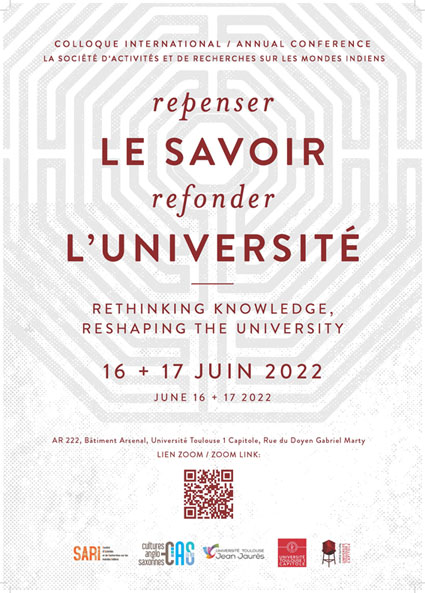
En présentiel : Salle AR 222, Bâtiment Arsenal Université Toulouse 1 Capitole, 2 rue du Doyen Gabriel Marty, Toulouse
En distanciel sur Zoom : https://ut-capitole-fr.zoom.us/j/95827176813
ID de réunion : 958 2717 6813
Jeudi 16 juin 2022
9h30 Ouverture du colloque : Allocution de Charlotte Rault, Directrice du Département Langues et Cultures, Université Toulouse 1 Capitole.
Présentation du colloque par Madhura Joshi et Ahmed Mulla
10h – 11h15 Conférence plénière / Plenary Session
Niraja Gopal Jayal (King’s College London): What (or Who) is the Indian University For?
Modération : Madhura Joshi et Ahmed Mulla
11h30 - 12h30 L’université : lieu d’échanges, de réflexion, de luttes / The University as a space of exchange, reflection and struggles
Modération Charlotte Rault
Michel Naumann (Université de Cergy) "El buen vivir" and Indian activists' new paradigms
Ludmila Volna (ERIAC Université Rouen Normandie, France; Charles University Prague, République Tchèque) Towards a Liberated Learning
Nishat Zaidi (Jamia Milia Islamia University) Decolonizing University: The Jamia Experiment
12h30 – 13h45 Pause déjeuner / Lunch Break
14h – 15h15 L’université, l’imaginaire et le monde/ The University, the Imaginary and the World
Modération Michel Naumann
Fabien Chartier (Université Rennes 1) La Visva-Bharati, utopie concrète d’un poète
Maria-Sabina Draga Alexandru (University of Bucharest) Universities as Sites of Individualism in Jhumpa Lahiri’s The Lowland and Whereabouts
15h15 Lecture de textes par Julie Duchaussoy, Espace Culturel de l’Université Toulouse 1 Capitole
15h30 – 16h30 Enjeux économiques et transformation sociétale : l’université, lieu d’émancipation ? / Economic stakes and societal transformation : the University, a place for emancipation ?
Modération : Mariana Teixeira Marques-Pujol
Cheshta Arora (National Institute of Advanced Studies, Bengaluru) and Debarun Sarkar (University of Mumbai)
No Publication, No Degree: Of knowledge-production as Doctoral Candidates in Anthropology/Sociology in India
Madhumeeta Sinha (English and Foreign Languages University, Hyderabad) University and Issues of Gender: Is Access Enough?
17h Assemblée Générale de la SARI
Vendredi 17 juin 2022
9h30 – 10h50 Politique(s) du savoir I : réflexions du sous-continent indien / Politics of Knowledge I: Reflections from the Indian sub-continent
Modération Fabien Chartier
Ingrid Sankey (Université Catholique de Lille) Vulgarisation, Education, Research and Politics: How Indian Historians and Media revisit the past of the subcontinent.
Manisha Rao (University of Mumbai) Rethinking the University as Commons: Understanding enclosures in State University Systems in India
Anupama Mohan (Presidency University, Kolkata) et Suddhaseel Sen (Indian Institute of Technology, Mumbai) The Impact of the Linguistic Turn on Scientific Discourse in Post-colonial India
11h – 12h15 Refonder l’université : approches postcoloniales et décoloniales / Reshaping the University : Postcolonial and Decolonial Approaches
Modération Ahmed Mulla
Camille Martinerie (Université d’Aix Marseille) Re-founding the (post-)colonial university in a neoliberal context: a historical contextualization of the South African debate on intellectual decolonization
Cédric Courtois (Université de Lille) Décoloni(ali)ser l’Université et les savoirs : pour « une éthique et une pratique politiques de la résistance »
12h30-13h45 Pause déjeuner / Lunch Break
14h Lecture de textes par Julie Duchaussoy, Espace Culturel de l’Université Toulouse 1 Capitole
14h15 – 15h45 Politique(s) du savoir II : réflexions du continent africain
Politics of Knowledge II: Reflections from the African continent
Modération Bairbre Ní Chiosáin
Faïka Farhat et Nadia Hebaz (Université de Tunis) Lutter contre la violence systémique de l'université mondialisée : un exemple tunisien en lettres et sciences humaines
Steeve Robert Renombo (Université de Libreville) Humanités endogènes et refondation des universités africaines subsahariennes
Mouhamed Ly (Université Cheikh Anta Diop, IFAN, Dakar) L’Université en Afrique noire francophone : ce que produire du savoir en français veut dire
16h – 16h30 Politique(s) du savoir III / Politics of Knowledge III
Modération Michel Naumann
Yves Laberge (Université d’Ottawa): Le rapport au savoir et la sociologie de l’ignorance : le mythe de la méritocratie à l’université
16h30 – 17h Discussion de clôture / Concluding Remarks
2021
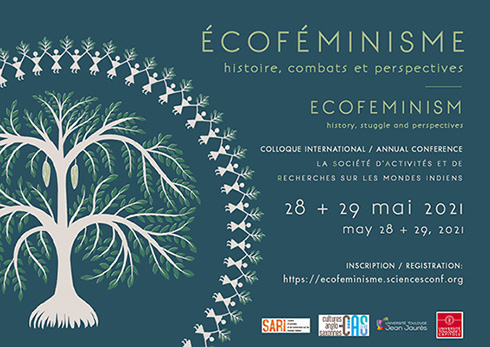
16eCOLLOQUE INTERNATIONAL ANNUEL DE LA SARI
ECOFÉMINISME : HISTOIRE, COMBATS ET PERSPECTIVES
28 et 29 mai 2021
Comité d’organisation : Madhura Joshi, Ahmed Mulla, Michel Naumann, Jitka de Préval, Caroline Trech
Comité scientifique : Madhu Benoît, Fabien Chartier, Geetha Ganapathy-Doré, Ahmed Mulla, Michel Naumann
PROGRAMME
VENDREDI 28 MAI 2021 • HISTOIRE ET COMBATS
13h Ouverture du colloque : allocution de Michel Martinez, Directeur du Département des Langues et Civilisations, Université Toulouse 1 Capitole.
13h15-14h45 Session 1 Combats actuels : Entre militantisme et activisme ?
13h15-14h Modération : Fabien Chartier (Université Rennes 1)
Michel Naumann (Université de Cergy) « Checking patriarchal forces: Indian ecological and recent social struggles »
Jayita Sengupta (Cooch Behar Panchanan Barma University), «Deep Ecology and The Role of Women in Sikkim Himalayas »
Madhumeeta Sinha (English and Foreign Languages University, Hyderabad),« Many Faces of Madness: Mindless Destruction with Snapshots of Preservation »
14h-14h45 Modération : Madhura Joshi (Université Toulouse 1 Capitole)
Joelle Weeks (Université Paris 1), « Eco-activists »
Claude-Hélène Brissac-Ferral (Université de La Réunion) « Arundathi Roy, écoféministe indienne ? »
Ahmed Mulla (Université de Guyane) « Non-Western Foundations of Ecofeminism in Vandana Shiva’s Writings and Activism »
15h-16h30 : Conférence plénière suivi de discussion animée par Michel Naumann et Fabien Chartier
Conférencier : Ganesh Devy (Chercheur indépendant) « Indigenous People, Eco-feminism and the Human Future »
17h – 18h30 Assemblée Générale de la SARI
SAMEDI 29 MAI 2021 • COMBATS ET PERSPECTIVES
13h30-14h30 Conférence plénière suivie de discussion
Modération : Madhura Joshi (Université Toulouse 1 Capitole)
Caroline Michon (Université Paris 8 Vincennes et CEIAS-EHESS), «Mouvements des femmes, politiques de développement et engagements environnementalistes en Inde : réflexions théoriques à partir de l’étude d’un espace urbain de mobilisations »
14h45-15h45 : Session 2 Ecofeminist movements and Discourse
Modération : Ahmed Mulla (Université de Guyane)
Manisha Rao (University of Mumbai) « Rethinking the Ecofeminist Discourse: Case of Appiko Chaluvali, Uttara Kannada District, Western Ghats, India »
Liliana Buitrago (Observatory of Political Ecology - Venezuela) « Ecofeminist Discourse Analysis of Women Territorial Life Defense: Emerging Common Notions from Abya Yala »
Goran Đurdevic et Suzana Marjanic (Capital Normal University, Beijing, et Institute of Ethology and Folklore Research in Zagreb) «Ecofeminist voices from South-Eastern Europe »
Sheilla Maria Resende (Université de Picardie Jules Verne (UPJV) et Universidade Estadual de Campinas (Unicamp)) « La parole des femmes caféicultrices au Brésil : l’agentivité et la (non) légitimité »
16h-17h15 : Session 3 Ecofeminism : Perspectives from Literature
Modération : Corinne Bigot, Université Toulouse 2 Jean Jaurès
Maria-Sabina Alexandru (University of
Bucharest) «Critical Ecofeminism in Amitav Ghosh’s Fiction: From The Hungry
Tide to Gun Island »
Suhasini Vincent (Université Paris 2 – Pantheon Assas) « An Eco-critical Analysis of Women and the Environment in Amitav Ghosh’s Gun Island »
Leslie de Bont (Université de Nantes) « The Dream of an Ecofeminist Foremother: An Alternate Representation of Nature, Technology and Gender Roles in Rokeya Sakhawat Hossain’s “Sultana’s Dream” (1905) »
Lydie Le Moine (Académie de Metz) « Magical Realism and Eco-Humanism in Hullabaloo in the Guava Orchard »
Malati Mathur (Indira Gandhi National Open University, New Delhi « Poetry from North East India: Nature and Identity »
17h30-18h – Conclusion et clôture du colloque
2019
14e Colloque international
annuel de la SARI - 2019
18 et 19 mai 2019
Dreaming India/India Dreaming
Lieu : MSH Paris Nord, Salle 401
20 Avenue
George Sand, 93210 Saint-Denis
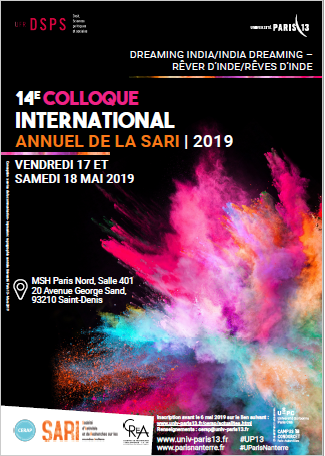
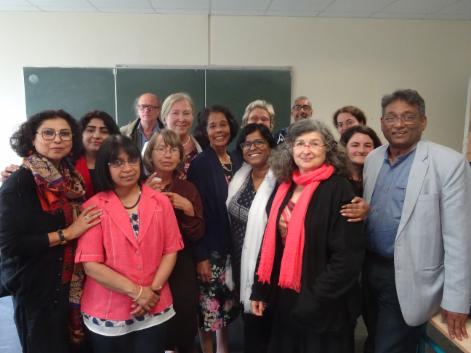
soutenu par le laboratoire CERAP de l'Université Paris 13 et le laboratoire CREA de l'Université Paris-Nanterre
11 et le 12 mai 2018
"La Résilience dans la littérature, la culture et le cinéma de l'Inde"
Lien pour s'inscrire
http://colloques.dsps.univ-paris13.fr/user/sinscrire/13
Découvrir les parcours biographiques
et
les résumés des intervenant-es
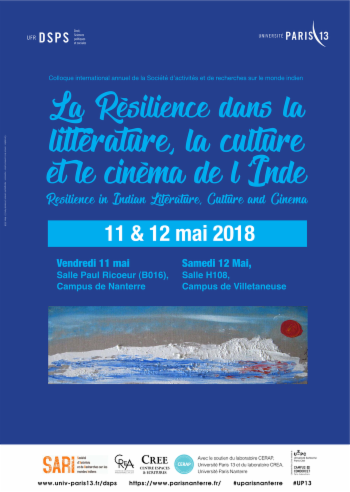
Programme du colloque
Vendredi 11 mai – Salle Paul Ricoeur (B016), Campus de Nanterre
9h Accueil
9h15-9h30 Ouverture
9h30-10h00 Christian SOMMADE (Haut comité français pour la défense civile) : Conférence plénière/Plenary Lecture on the notion of resilience[G1]
10h-10h15 Dialogue avec M. Sommade
Session 1: Littérature, miroir de la résilience/Resilience as reflected in Literature
10h15-10h45 Ahlem FIDOUH (Université Oran 2) : "La Résilience littéraire dans la période pré-indépendance de l’Inde"
10h45-11h15 Angelina GIRET-TURRO (Université du Havre) : "The Rising Figure of the Indian Woman 1850-1915- Resilience through Education"
11h15-11h45 Suddhaseel SEN (IIT, Mumbai) : "Nationalist cosmopolitanism and cultural resistance in colonial India"
Session 2: Littérature, miroir de la résilience/Resilience as reflected in Literature (continued)
13h30 -14h Ludmila VOLNá(Université de Rouen Normandie/Charles University) : "R. K. Narayan's Resilient Characters: India's Search for Identity"
14h -14h30 Ahmed MULLA (Université de Guyane) : "Resilience as (Re)Invention in Akhil Sharma’s Family Life"
14h30 -15h Dhana UNDERWOOD (Independent Scholar) : "Sunjeev Sahota, The Year of the Runaways[G7] : Politique de résilience et de survie"
15h-15h30 Subhendu MUND (IIT Bhubaneswar) : "Resilience as Way of Life: Suffering and Acceptance in the Indian Literary Tradition[G8] "
15h30-15h45 Pause Café/Coffee break
Session 3: La résilience vue à travers le prisme des arts visuels/Resilience seen through the Prism of Visual Arts
15h45-16h15 Caroline TRECH (Université de Rouen Normandie) : "Resilience or non-resilience in hybrid British films of the South-Asian diaspora"
16h15-16h45 Jitka DE PREVAL (Université Paris 3 – Sorbonne Nouvelle) : "L’esthétique de résilience du héros dans le cinéma populaire hindi"
16h45-17h15 Jayita SENGUPTA (Cooch Behar Panchanan Barma University) : Visual Art, Resistance and Resilience"
17h15-18h15 Assemblée générale de la SARI
Samedi 12 Mai, Salle H108, Campus de Villetaneuse
Session 4: Courant de résilience/courant dominant/Resilience versus Mainstream
9h30-10h Nishat ZAIDI (Jamia Millia Islamia, Delhi) : "Nationalistic Politics vs Cultural Resilience: Urdu in Post-Parition India"
10h-10h30 Debashree DATTARAY (Jadavpur University, Calcutta) : "Aesthetics and Resilience: Cultural Resistance in the poetry of North East India"
10h30-11h Chandrabanu PATTANAYAK (Centurion University, Bhubaneswar) : "The Resilient Tribal and Mediated Orality"
11h-11h15 Pause
Session 5: Résilience générationnelle/Generation and Resilience
11h15-11h45 Savita SINGH (Indira Gandhi National Open University, New Delhi) : "A ‘Beyond’ within the Anthropocene : Creation of young ‘Pasho’ in Krishna Sobti’s Novella “Daar Se Bichuri”
11h45-12h15 Corinne ALEXANDRE-GARNER (Université Paris Nanterre) et Cécile OUMHANI (écrivaine) : Dialogue avec Umi Sinha, auteure de Belonging[G9]
Lunch 12h15-14h Déjeuner/Lunch
Session 6: Mondialisation et résilience/Globalization and Resilience
14h-14h30 Michel NAUMANN (Université de Cergy-Pontoise) : "Resilience in the short story "The Drought" by Shandra Sengupta[G10] "
14h30-15h Geetha GANAPATHY-DORE (Université Paris 13): "Farmer Suicide Narratives in Indian Fiction as part of the Global Story of Resistance and Resilience"
15h-15h30Anupama MOHAN (Presidency University, Calcutta): "Resilience in the Age of Neoliberalism: A Case for Collective Fragility"
Photos du colloque SARI 2017 dans l'ordre du déroulement du programme
INSCRIPTIONS OBLIGATOIRES AVANT LE 25 JUIN 2017
www.univ-paris13.fr/cerap/actualites.html
Colloque annuel international de la SARI
29-30 Juin 2017
Université Paris 13, Campus de Villetaneuse
Réinventer la mer – Précarité, épistémologie et récits
Avec le soutien du CERAP, de la Faculté de Droit, Sciences politiques et sociales et de la Commission recherche de l'Université Paris 13, Sorbonne Paris Cité, du CREA de l'Université Nanterre et de l'ERIAC de l'Université Rouen Normandie
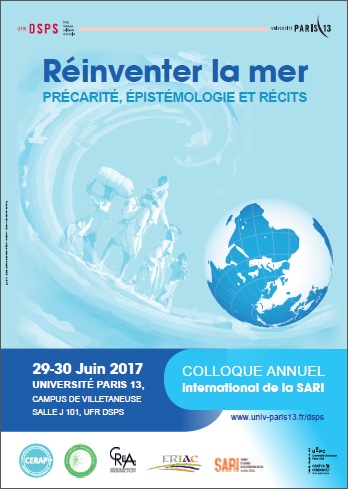
Jeudi 29 juin
8h30 Accueil
9h – 9h15 Mots de bienvenue par Didier GUEVEL le Doyen de la faculté de Droit, Sciences politiques et sociales et par Eric DESMONS, le Directeur du CERAP.
9h15 - 9h30 Ouverture par Corinne ALEXANDRE-GARNER, Directrice du Centre Espace/Ecritures du CREA, Université Paris Nanterre.
Session 1 : Océans de savoir – Présidence Corinne Alexandre-Garner (Université Paris Nanterre)
9h30-10h - Ingrid SANKEY (ESPOL, Université Catholique de Lille) : "Teaching Global History and Geography using the Indian Ocean as a unit of analysis".
10h-10h30 - Michel NAUMANN (Université de Cergy) : "Globalization and its three oceans".
10h30–11h - Bhaskar SENGUPTA (Rabindra Bharati University, Kolkata) : "Sinking of the coastline of Deltaic West Bengal and endangered marine flora and fauna due to discharge of toxic effluent carried by river Ganges".
11h-12h - Key Note : Jean-Marie KOWALSKI (Ecole navale de Brest) : "Sailing the Indian Ocean in Ancient Times".
12-14h – Déjeuner
Session 2 : La mer – mythes, histoires, mémoires et récits – Présidence Belkacem BELMEKKI (Université d'Oran)
14h-14h30 - Hans-Peter SOEDER (University of Munich) : "Water and Culture(s): An Exploration of the Mythic Dimensions of the Sea".
14h30-15h - Jayita SENGUPTA (Independent Scholar) : "Sea: Mythological/ Mythical Dimensions in Indian Imagination".
15h-15h30 - Nishat ZAIDI (Jamia Milia Islamia, Delhi) : "Oceanic Encounters with the Other in Travelogues by Early Muslim Travellers to the West".
15h30-16h - Brinda MEHTA (Mills College Oakland, CA): "Historicizing the Sea in francophone Kala Pani Narratives".
16h-16h30 - Subhendu MUND (BJB Autonomous College, Bhubaneswar) : "Odisha’s Maritime History, Odia Collective Memory and Identity Politics".
16h30-16h45h – Pause café
16h45-18h - AG de la SARI
Vendredi 30 juin 2017
Session 3 : La vague Amitav Ghosh – Présidence Michel Naumann (Université de Cergy-Pontoise)
8h45-9h15 - Dhana Underwood (Chercheuse indépendante, Royaume Uni) : "L’image ambivalente de l’Océan dans la trilogie de Amitav Ghosh, Sea of Poppies, (2008) River of Smoke (2011) Flood of Fire, (2015) : rétribution ou réparation ?".
9h15-9h45h - Ahmed MULLA (Université de la Réunion) : "A mosaic on the move : different processes of creolisation in Amitav Ghosh’s Sea of Poppies".
9h45-10h15 - Maria-Sabina DRAGA ALEXANDRU (Université de Bucharest) : "A Sea of Violence and Love: Precarity, Eco-Fiction and the American Factor in Amitav Ghosh's The Hungry Tide".
10h15-10h45 - Anupama MOHAN (Presidency University, Kolkata) : "Maritime Transmodernities and the Ibis Trilogy".
10h45-11h - Pause
Session 4 : La mer-métaphore – Présidence Cécile Oumhani (romancière et poétesse)
11h-11h30 - Ludmila VOLNÁ (ERIAC, Université de Rouen Normandie/Charles University) : "Salman Rushdie's Sea World: Haroun and the Sea of Stories".
11h30-12h - Debasish LAHIRI (University of Calcutta) : "Sea-Ink Ledgers: From Poetry's Island Sojourns".
12h-14h - Déjeuner
Session 5 : Perspectives régionales et cartographie nationale – Geetha Ganapathy-Doré (Université Paris 13)
14h-14h30 - Donel VARGHESE (Indian Institute of Technology, Mumbai) : "Through the Native Eyes: The Story of Varthamanapusthakam and the Historical Journey to Rome".
14h30 -15h - Anchitha KRISHNA (Indian Institute of Technology, Chennai) : "Voices from the silent shores: A study of Matsyaganddhi by M.Sajitha".
15h-15h30 - Debashree DATTARAY (Jadavpur University) : "A Sea For Encounters: Changing Epistemologies in T.S. Pillai’s Chemmeen".
15h30–16h - Pradipta MUKHERJEE (Vidyasagar College for Women, University of Calcutta) : "Cartographies of Nation, Testimonies of Dislocation: Indian Partition Films".
16h-16h15 - Pause café
Session 6 : La mer toujours recommencée – Présidence Ludmila Volná (Université de Rouen Normandie)
16h15-16h45 - Joëlle WEEKS (Université de Paris I- Panthéon Sorbonne) : "Sea Passage to India in the 18th Century: Geopolitics- Trade- Ideology- Utopia".
16h45- 17h15 - Suddhaseel SEN (Indian Institute of Technology, Mumbai) : "Connecting Rāma Sētu to the Hooghly: British Colonialism and Michael Madhusudan Datta’s Mēghnādavadha-Kāvya".
17h15-17h45 - Elizabeth DAHAB (California State University, Long Beach) : "Burial at Sea: Reconciliation and Bereavement in Wajdi Mouawad’s Littoral (Tideline)".
17h45-18h15 - Geetha GANAPATHY-DORE (Université Paris 13 , USPC) : "Sonali Deraniyagala's Wave (2013), Philippa Hawley's There is No Sea in Salford (2013) and Minoli Salgado's A Little Dust in the Eyes (2014): A Study of Tsunami Narratives".
***
Colloque à l'Université d'Oran le 2 et 3 mai 2017 : "Imaginaire au carrefour des disciplines"

cliquer sur le lien suivant pour lire
***
Photos du colloque SARI 2016 soutenu par la commission recherche de l'Université Paris 13, l'UFR DSPS, CERAP, CREA (Université Paris Ouest), ERIAC (Université de Rouen), Conseil régional de l'Ile de France. Avec le concours de l'Ambassade de l'Inde
Photos de la conférence
https://www.facebook.com/media/set/?set=a.1163768393674204.1073741980.159176037466783&type=3
Les pages des poètes qui sont intervenus à la fin : Savita Singh, Shruti Das, Anupama Mohan, Elizabeth Dahab, Ludmila Volna, Subhendu Mund
http://www.stagebuzz.info/PAGES/Books/Book_Mark11.htm
http://www.partridgepublishing.com/India/Books/bookdetail.aspx?bookid=BK150324
http://www.writersworkshopindia.com/books/poetry/redbird/twenty-odd-love-poems-and-then-some/
http://www.cla.csulb.edu/departments/complit-classics/faculty-and-staff/professor-elizabeth-dahab/
http://eriac.univ-rouen.fr/author/ludmila-volna/
https://subhendumund.wordpress.com/publications/
Notre partenaire pour le prochain colloque
« Violets in a Crucible » – La Traduction comme lieu de passage
Grenoble, 22-24 juin 2016
Site web :
https://violetsinacrucible.wordpress.com/
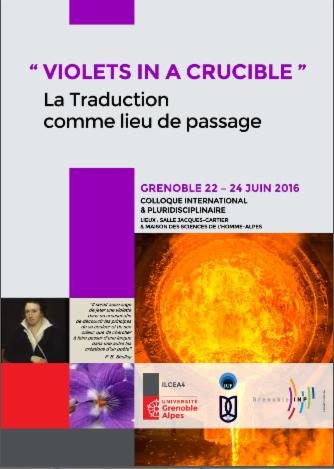
__________________________________________________________________________________
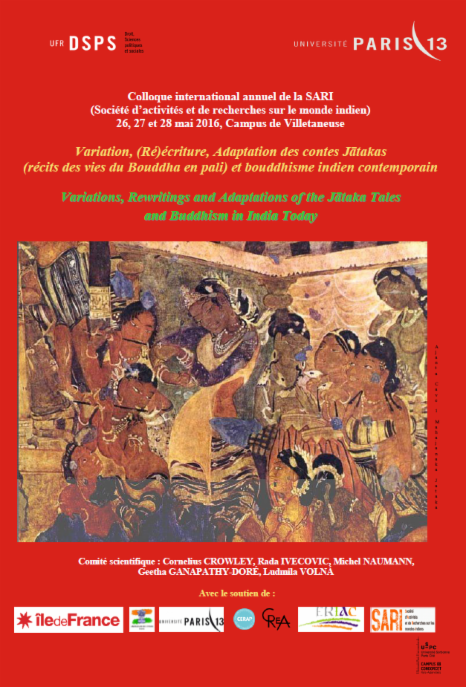
Jeudi 26 mai 2016, Salle J101
9h00 - 9h30 Accueil et inscriptions
9h30 - 10h00 Ouverture
Par le Président de l’Université Paris 13
Mots de bien venue par le Professeur Didier Guével, Doyen de la Faculté de Droit, Sciences politiques et sociales, Université Paris 13.
Session 1 - Vies du Bouddha dans l’art et la littérature himalayens/Lives of the Buddha in Himalayan Art and Literature
Président de séance: Professeur Cornelius CROWLEY, Université Paris Ouest Nanterre La Défense, France.
10h00 - 10h30
Jayita SENGUPTA, Sikkim University, Inde: "Buddha in New Resurrections: A Comparative Analysis of The Birth of the Maitreya and Buddhas of the Celestial Gallery."
Session plénière 1
10h30 - 11h30
Conférence du Professeur Jon SOLOMON, Université de Lyon 3, France: Translating Enlightenment: Towards a transcultural meaning of Enlightenment."
11h45 - 12h30
Spectacle culturel : Récital de danse par Janaki NAIR (Université de Northumbria, Royaume Uni) suivi d’une discussion avec le public à la Chaufferie.
12h30 - 14:h15: Buffet indien
Session 2 - Émancipation de l’oppression/Emancipation from oppression
Présidente de séance : Dr. Corinne ALEXANDRE-GARNER, Université Paris Ouest Nanterre La Défense, France.
14h15 - 14h45
Nishat ZAIDI, Jamia Millia Islamia, New Delhi, Inde: "Partition, Migration and the Quest for Meaning in Times of Moral Crisis: Intizar Husain's Adaptation of Jātakas in his Urdu Short Stories."
14h45 - 15h15
Michel NAUMANN, Université de Cergy, France: "Les Jātakas des incroyants ou les récits des incroyants sur les origines du Bouddha."
15h15 -15h45
Neekee CHATURVEDI, University of Rajasthan, Jaipur, Inde: "Recovering the Repressed, their Oppression and Coping Strategies through the Jātaka Tales."
15h45 - 16h15
Shruti DAS, Berhampur University, Odisha, Inde : "Renaissance of Buddhism, Ambedkar and Dalit Emancipation in India."
16h15-16h30 Pause café
16h30-17h30 Assemblée générale de la SARI.
Vendredi 27 mai 2016, Salle J101
Session 3 - Nouvelles manifestations/New Manifestations
Présidente de séance : Professeure Madhu BENOIT, Université de Grenoble, France.
9h30 - 10h00
Deborah JENNER, Université de Paris 1—Panthéon Sorbonne, France : "Could American “tricksters” be Bodhisattvas?"
10h00 - 10h30
Elizabeth DAHAB, California State University, USA : "The Rebirth of Ganesh in VS Naipaul’s The Mystic Masseur."
10h30 - 11h00
Ludmila VOLNÁ, ERIAC, Université de Rouen, France : "Devadhamma Jātaka and Rusalka: Water, Sprites, and New Beginnings."
Session plénière 2
11h00 - 12h00
Conférence de Dr. Naomi APPLETON, University of Edinburgh, UK : “Jātaka Stories as Indian Literature.”
12:00 - 14:00 Vernissage et cocktail (Café Expo)
Exposition de photographies en couleur de Benoy K. Behl : "The Path of Compassion. Buddhist Sites and Art Heritage."
Session 4 - Jātakas dans l’écriture anglaise, anglo-indienne et indo-anglaise/Jātaka Tales in
English, Anglo-Indian and Indo-Anglian Writing
Présidente de Séance : Dr Ludmila VOLNÁ,Université de Rouen, France.
14:00 - 14:30
Subhendu MUND, BJB Autonomous College Bhubaneswar, IIT Bhubaneswar, India : "Travelling Tales: Migration, Translation, Adaptation and Appropriation of the Jātaka Katha. An Exploration through Fables of Bidpai: The Morall Philosophie of Doni (1570)by Sir Thomas North."
14:30 - 15:00
Maria-Sabina DRAGA ALEXANDRU, University of Bucharest, Roumanie : "Jātaka Tales and Kipling's Commitment to India."
15:00 - 16:00
Debashree DATTARAY, Jadavpur University, Inde : "Cultural memory and the birth of a nation: Jātakas in the writings of Gandhi and Rabindranath."
Session 5 - Les contes Jātakas dans les arts du spectacle /Jātakas in Performing Arts
Président de séance : Professeur Michel NAUMANN, Université de Cergy, France.
16h00 - 16h45
Chris DORSETT, artist-curator, Northumbria University, UK, and Janaki NAIR, Kathakali dancer, Northumbria University, UK : "Revisiting Tantra: contemporary British and Indian responses to the Tantra-oriented songs of Rabindranath Tagore."
16h45-17h Pause café
Samedi 28 mai 2016, Salle J101
Session 6 - Regard sri lankais sur les contes Jātakas /Sri Lankan Gazes on Jātaka Tales
Présidente de séance : Dr. Joelle WEEKS, Université de Paris 1—Panthéon Sorbonne, France.
10h00 - 10h30
Anupama MOHAN, Presidency University, Kolkata, Inde : "Martin Wickramasinghe and The Jātakas in Sinhala Literature."
10h30 – 11h
Geetha GANAPATHY-DORÉ, Université Paris 13, Sorbonne Paris Cité, France : "A Fictional Evaluation of Buddhism in Postcolonial Sri Lanka: Manuka Wijesinghe's Trilogy."
11h-11h15
Conclusion par la présidente de la SARI
Sites web
https://www.univ-paris13.fr/
www.sari-france.org/
Informations pratiques
Inscriptions : 10 euros (gratuits pour les doctorants-e). Règlement sur place auprès de la trésorière de la SARI.
Inscription obligatoire par email au : recherche.dsps@univ-paris13.fr
Accès du campus de Villetaneuse
Ligne H à la Gare du Nord (quais 30-36) en direction du Valmondois. Descendre à Épinay-Villetaneuse, puis prendre le bus 156. Arrêt: Université de Paris 13.
Tramway T8
En voiture
Porte de la Chapelle > Autoroute A1 direction Lille, puis Sortie N°2 (Saint-Denis - Stade de France),
puis direction Villetaneuse Université.
Cliquer sur les liens suivants pour plus d'information
Short biographies
Abstracts
_________________________________________________________________________________
Oran international Conference on Africa 10 & 11 May 2016
Consulter le dépliant du programme
_________________________________________________________________________________
Lien pour visionner les vidéos pour la matinée du samedi 30 mai 2015
Colloque intitulé « Héritages et ruptures/Heritage and Ruptures»
Dates : 28-29-30 mai 2015
Lieu d’accueil : Université de Paris-Ouest Nanterre La défense et l'Université Paris 13
Cliquer sur les liens suivants:
1. Le programme du colloque 2015.
2. Le formulaire d'inscription au colloque.
3. Les plans d'accès des deux campus.
4. Le texte de cadrage (version bilingue).
5. Le parcours professionnel des intervenants.
6. Short biographies of guest speakers, invited artists and paper presenters.
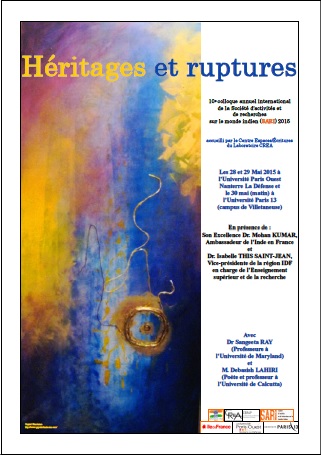
Evénements terminés
Colloque intitulé "Luttes anti-colonailes entre discours, représentation et réception"
Le 12 et le 13 mai 2015 à l'Université Oran 2 Mohamed Ben Ahmed
Voir le programme
Page 1
Manifestation "Know India/L'Inde au-delà des clichés" organisée par l'Université Paris 13, avec le soutien de l'Ambassade de l'Inde et la SARI du 13 octobre au 24 octobre 2014
Invitation
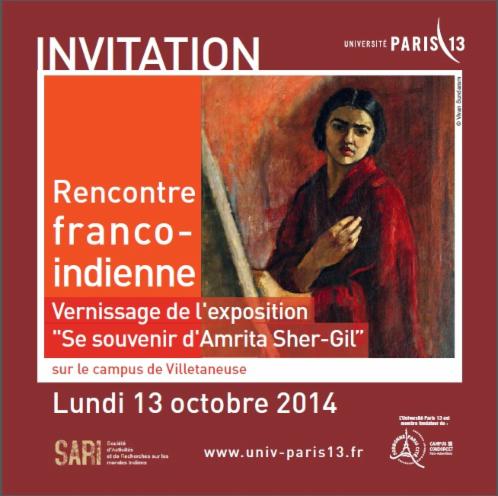
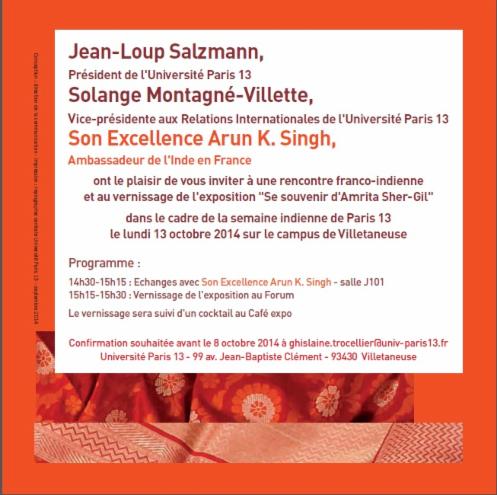
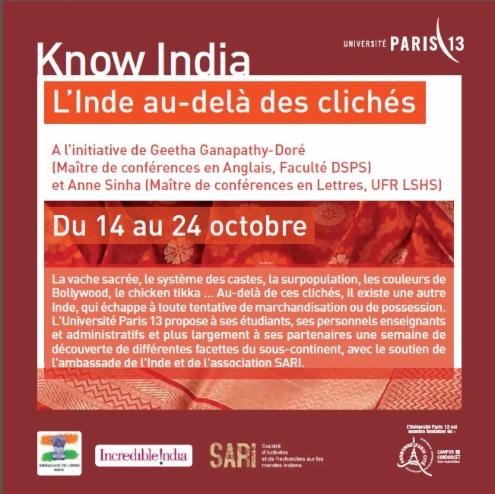
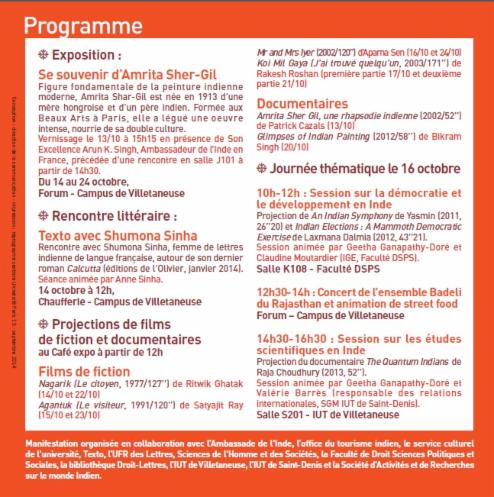
Colloque à l’Université d’Oran en mai 2014
Colloque intitulé « Challenging the Mainstream/A rebours »
Responsables: Michel NAUMANN et Ruby GAZAY
Dates : 6-7 juin 2014
Lieu d’accueil : Université Cergy-Pontoise
A rebours (Against the Mainstream) : 5-6 juin 2014
Conférence CICC-SARI-UCP
5 JUIN 2014
9.00 : Ouverture puis introduction à partir de la zomia par Michel Naumann. (Cergy)
Un monde rebelle :
9.30 : Remise en cause de la Chota Bharat à Maurice par Cécile Jest.
10.00 : The Abhidhamma and the Ecology of the Mind par Jacques Coulardeau.
10.30 : Tagore et l’Etat par Fabien Chartier.
11.00 : Badrudin Tyabi contre le séparatisme par Belkacem Belmekki. (Oran)
11.30 : Le cas de la Kabylie en Algérie par Karima Zerouali. (Cergy)
12.00 : Frantz Fanon par Christiane Achour. (Cergy)
12.30 repas
14.00 : Swimming Against the Tide: Geopolitics and the Story of the Bilingual Education Programme in Jamaica par Sandra Colly-Durant. (Cergy)
14.30 : La Chine à rebours des media occidentaux par Lucie Wang. (Cergy)
15.00 : Conséquences des grands barrages en Inde et au Bangladesh à travers deux cas par Nadia Alamgir. (Cergy)
15.30 : Guest Speaker : Le soulèvement dalit du Tamil Nadu par Azhagarasan Rajaminickam. (Chennai)
15.45 Débat général sur le thème
16.15 AG du SARI.
6 JUIN 2014
La moitié du ciel : luttes des femmes.
9.00 : Harriet Martineau, une victorienne engagée par Odile Boucher-Rivalain. (Cergy)
9.30 La femme camerounaise par Corinne Penverne. (Cergy)
10.00 : I am Malala : The Reception of Malala Yousafzai's Memoir par Christopher Rollason. (Luxembourg)
Arts et littérature : des armes de combat ?
10.30 : La femme face au patriarcat chez Arundhati Roy par Fewza Bedjaoui. (Sidi Bel Abbes)
11.00 : Draupati Writes Back par Shruti Das. (Berhampur University,Odisha)
11.30 : Les écrivaines réécrivent l’histoire latino-américaine par Luisa Bellestero. (Cergy)
12.00 : Ngozi Adiche et la guerre du Biafra par Odile Talon. (Cergy)
12.30 : repas.
14.00 : Music Activism par Bisweswar Pattnaik. (SP College, University of Odisha)
14.30 : Onir à contre courant de Bollywood par Caroline Trech. (Université du Littoral Côte d'Opale)
15.00 : Le contre-discours de la littérature de Guinée-équatoriale par Natalia Naydenova. (Université russe de l'Amitié des peuples, Moscou)
15.30 : « The Encantadas » par Fadhila Sidi-Said. (Tizi-Ouzou)
16.00 : Hearn : l’éternel féminin à contre-courant par Marc Rolland. (Boulogne)
16.30 : Khalil Gibran face au courant dominant du Christianisme. Par Azzedine Bouhassoun. (Ain Temouchent)
17.00 : Resisting Reality, Towards Reality : R.K. Narayan’s The English Teacher par Ludmila Volna. (Prague)
17.30 : Regard d’un romancier pakistanais sur son pays par Michel Naumann. (Cergy)